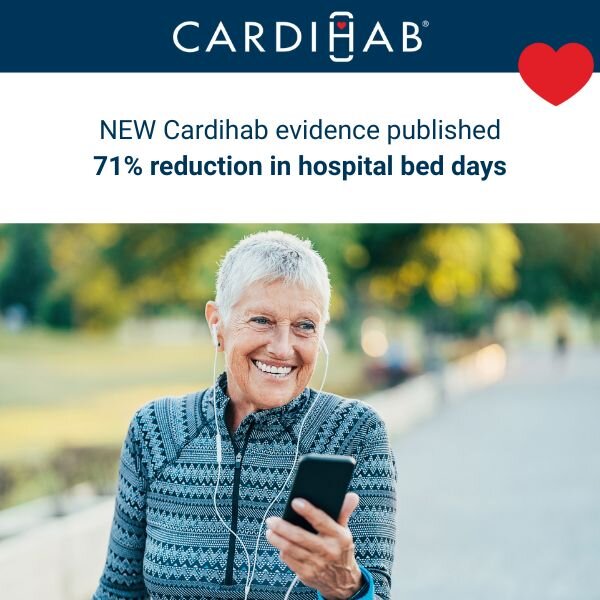NEW Cardihab evidence published in European Heart Journal

Cardihab’s cardiac rehab Program Cuts Hospital Readmission Days by Over 70%
A new study published in the European Heart Journal has confirmed what Cardihab has long championed: virtual cardiac rehabilitation is not only clinically effective but transformative for patient outcomes. Medibank’s Heart Health at Home program, delivered by Amplar Health and powered by Cardihab’s digital therapeutic platform, was associated with a 71% reduction in hospital readmission dayswithin three months.
The independent evaluation, conducted by the Baker Heart and Diabetes Institute, assessed 176 Medibank customers recovering from recent cardiac events. Through personalised support, digital tracking, and lifestyle coaching—enabled via Cardihab’s clinically validated technology—participants were able to engage with their rehabilitation in a flexible, accessible format that delivered significant outcomes..
Medibank’s Group Chief Medical Officer Dr Andrew Wilson said it’s time we change how we treat CVD. “Traditionally, patients who experience a cardiac event are discharged from hospital with little to no follow-up. While face-to-face rehabilitation has long been considered the gold standard, the reality is that many patients do not engage in these programs after their event. Studies show that around 30% of eligible patients are referred for cardiac rehabilitation, and only 28% of those referred actually attend.”
— Dr Andrew Wilson, Group Chief Medical Officer, Medibank
Closing the Gap in Cardiac Care
With over 1.3 million Australians living with cardiovascular disease and an estimated $14.3 billion spent annually on related care, the opportunity to rethink how preventative healthcare is delivered is more urgent than ever. While cardiac rehabilitation is known to improve recovery, survival and quality of life, access challenges—particularly for people in rural, remote, or busy urban settings—have left many patients without support.
“While conventional face to face programs play an important role in patient care, they are only accessed by a small minority. Currently 80-90% of eligible patients miss out” said Helen Souris Cardihab CEO.
These findings point to an urgent opportunity to prioritise preventative care with purpose built solutions. Cardihab is transforming the landscape of cardiac rehabilitation, providing a validated, digital-first solution that ensures patients receive timely, accessible, and effective care—wherever they are. With this new research demonstrating significant reductions in hospital bed days, improved participation and outcomes, the case for digital cardiac rehab has never been stronger.
“Addressing the stark gap in healthcare equity can only be achieved by providing patients with greater choice of validated digital programs. We have to change how we offer and deliver rehab if we are to make any material impact on equitable access to care and health system effectiveness.”
Cardihab’s digital platform bridges the access gap, enabling nurse-led programs to be delivered wherever the patient is, through an easy-to-use app and phone-based coaching. This model ensures consistency, scalability, and stronger patient engagement—reflected in the program’s reported 91% completion rate.
“Importantly, people are more likely to commit to them, as they can participate from the comfort of their own home. This is particularly valuable for individuals living in rural and regional areas, while also offering greater convenience for those in metropolitan regions. As a result, virtual programs have contributed to a reduction in readmission days following cardiac events, as patients are more engaged in their recovery when they do return to care.”
— Dr Andrew Wilson
Measurable Impact, Delivered Digitally
The Heart Health at Home program provides 6 to 8 weeks of structured rehabilitation, offering coaching, digital tools, and tailored lifestyle advice. Among the results:
- Physical activity more than doubled (from 128 to 300 minutes/week)
- Improvements in diet, BMI, blood pressure, and functional capacity
- Reduced depression and anxiety
- Increased self-management confidence and quality of life
“Our analysis showed improvements across nearly all clinical, behavioural and lifestyle risk factors. Participants recorded a 71% reduction in hospital readmission days within 3 months, compared to a natural sample of patients who were eligible for cardiac rehabilitation but unlikely participated in rehabilitation as they did not have a cardiac rehabilitation insurance claim.”
“This gives us confidence that digital health with nurse coordinated care can play a major role in managing chronic disease.”
— A/Prof Melinda Carrington, Baker Heart and Diabetes Institute
“Our public health system should look at what’s working in the private system and consider making these innovations accessible to the community more broadly. Programs like Heart Health at Home not only deliver very strong outcomes but also help relieve pressure on public hospitals.”
“Worldwide, healthcare is shifting—towards digitally enabled, personalised, and connected care. Australia needs to keep pace. We’re calling for greater investment in prevention-focused programs that align with how people want to access care—at home, digitally, and affordably.”
— Dr Andrew Wilson
"Is Digital Cardiac Rehabilitation the New Gold Standard"
To hear more about these results from a live panel, register your interest to attend our webinar.
Live Webinar: 21st July 1.30pm-2.30pm AEST
Cardihab Webinar expression of interest
Read the publication:
Read more on Medibank’s newsroom:
Medibank's virtual cardiac rehab program reduces hospital readmission days by over 70%
Watch the Channel 9 News coverage on YouTube